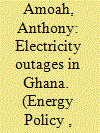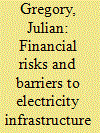|
|
|
Sort Order |
|
|
|
Items / Page
|
|
|
|
|
|
|
| Srl | Item |
| 1 |
ID:
091702


|
|
|
|
|
| Publication |
2009.
|
| Summary/Abstract |
Electricity demand in South Africa has grown at a very rapid rate over the past decade. As part of reform initiatives to enhance long-term sustainability of the country's electricity industry, South Africa's authorities have in recent years sought to develop an electricity pricing framework that is cost reflective and forms the cornerstone of demand management schemes meant to foster changes in consumption behaviour and enhance efficiency in resource use. The effects of any pricing policy on aggregate electricity consumption will depend on a useful understanding of the factors that influence electricity demand, and the magnitude to which electricity demand responds to changes in such factors. In this context, this paper applies the bounds testing approach to cointegration within an autoregressive distributed lag framework to examine the aggregate demand for electricity in South Africa during the period 1960-2007. The results indicate that in the long run, income is the main determinant of electricity demand. With electricity prices having an insignificant effect on aggregate electricity demand, future pricing policies will need to ensure that electricity prices are cost reflective and enhance efficiency of electricity supply and use.
|
|
|
|
|
|
|
|
|
|
|
|
|
|
|
|
| 2 |
ID:
118854


|
|
|
|
|
| Publication |
2013.
|
| Summary/Abstract |
The beneficial results of the exponential expansion of photovoltaic installations in Germany and Italy are discussed. Remarkable falls in the peak price of electricity have been observed in both countries. The reasons are discussed in the light of the data from the Kombikraftwerk project. This has demonstrated, in a scaled, real-time experiment, how the demand on the German grid can be met by photovoltaics and wind with back-up from biogas and (pumped hydro) storage. We discuss the implications of the fall in price of photovoltaic cells particularly for 3rd generation technology. Using the specific example of the UK, we demonstrate the advantages of the complementary nature of wind and photovoltaic resources. We demonstrate that the wind and photovoltaic capacity targets for an all renewably powered UK are likely to be significantly lower than in Germany. We conclude by summarising the evidence in favour of a moratorium on all new electricity generation other than by the renewables.
|
|
|
|
|
|
|
|
|
|
|
|
|
|
|
|
| 3 |
ID:
166392


|
|
|
|
|
| Summary/Abstract |
Climate change is likely to affect water availability and therefore hydropower generation in many regions of the world. In drying regions, hydropower generation may be impaired, creating a need for new power investments that would otherwise have been unnecessary. In this study we apply two partial equilibrium models (GCAM and TIAM-ECN) and two general equilibrium models (MEG4C and Phoenix) to identify possible pathways of power sector adaptation for Colombia under climate change. We adopt two GCM projections that deteriorate hydropower generation over the next three decades, and simulate each for two radiative forcing scenarios (RCP8.5 and RCP4.5). Relative to Colombia's projected power demand growth over the coming decades, losses in hydropower generation are marginal. Nonetheless, climate-driven losses in hydropower must be compensated by alternative technologies´expansion, which vary significantly across models. When climate policy is implemented (RCP4.5), three distinct expansion pathways emerge: increased solar and wind energy (TIAM-ECN); significant power demand reductions (Phoenix and MEG4C); and increased fossil resources with carbon dioxide capture and storage (GCAM). We show the need to explore the tradeoffs/synergies among alternative expansion pathways and their potential impacts on other sectors (e.g. water and land), and for effective policies to incentivize their adoption in Colombia.
|
|
|
|
|
|
|
|
|
|
|
|
|
|
|
|
| 4 |
ID:
150053


|
|
|
|
|
| Summary/Abstract |
This paper investigates the role that the building of two new power stations, Medupi and Kusile, will play in facilitating future economic activity in South Africa. We use a dynamic computable general equilibrium (CGE) model to estimate the economy-wide effects of these new power stations. Our simulation results also provide insight into how much the local economy has lost due to inadequate electricity supply in the period leading up to the construction of Medupi and Kusile. We find that the decision to build additional power generation capacity was necessary and justified, and that the failure to sooner recognise the need for expansion of the country's electricity generation capacity and subsequent delays in commissioning Medupi and Kusile, likely cost the economy over R110bn in lost production. Additional analysis, in which a further two-year delay in the construction of Medupi and Kusile is simulated, shows that such an event will cause the economy to perform below baseline projections up to 2022.
|
|
|
|
|
|
|
|
|
|
|
|
|
|
|
|
| 5 |
ID:
169877


|
|
|
|
|
| Summary/Abstract |
African countries experience persistent and serious energy outages, but while multiple valuation studies provide estimates of the costs of electricity outages in high-income countries, evidence is scarce for lower- and middle-income countries. The few studies that assess the value of reliable energy supply rely on the contingent valuation method that is under wide scrutiny. This paper aims to provide new estimates of households' willingness to pay to reduce electricity outages for Ghana and contributes to the debate on the validity of contingent valuation results for energy reliability. Our results suggest that households are willing to pay GHS 67 ($17) per month for reliable electricity supply, equivalent to 7% of respondents’ income. The results of tests for hypothetical bias, WTP-WTA disparity and income effects suggest that the contingent valuation estimates from this study are robust and can support decision makers in prioritizing energy policies and investments.
|
|
|
|
|
|
|
|
|
|
|
|
|
|
|
|
| 6 |
ID:
112249


|
|
|
|
|
| Publication |
2012.
|
| Summary/Abstract |
Despite three decades of reform, the electric power industry in China is still organised by a partial reformed plan system, where the investment to build capacity has been liberalised, but the prices and the production remain controlled by the state. This paper examines the pricing behaviour of the power supply in China, where the state attempts to balance the interest between the public and the electric power industry. The empirical evidence shows that the cost factors are critical to the electricity pricing in China, and that the bargaining mechanism, which sets the plan price, allows the power producers to face a soft budget constraint on their own costs.
|
|
|
|
|
|
|
|
|
|
|
|
|
|
|
|
| 7 |
ID:
162968


|
|
|
|
|
| Summary/Abstract |
The recent academic literature contains a number of hypotheses, drivers, or explanations to reveal why electricity infrastructure isn’t being developed within sub-Saharan Africa (SSA) in the 21st century. In this paper, we argue that this literature is misdirected, or at least incomplete, in how it approaches risk. We hypothesise that this lack of infrastructure development in the region reflects a dearth of investment due to the existence of excessive negative uncertainties or risks – as investment is a function of uncertainty and reward – but that the recent academic literature appears to not appreciate this. To make this argument, we chose a manageable sample of three African countries, which already had a notable body of academic literature concerning them: Kenya, Mozambique and Tanzania. Focusing on these countries, we then undertook a systematic review of 815 ‘peer reviewed’ papers published on the academic libraries of Scopus and/or the Web of Science on the topic of electricity, infrastructure, and risk over a five-year period to see how this literature evaluated the problem. Drawing from the most relevant 101 studies within that sample, we critically examine the methodological, conceptual, and empirical aspects of this literature.
|
|
|
|
|
|
|
|
|
|
|
|
|
|
|
|
| 8 |
ID:
094896


|
|
|
|
|
| Publication |
2010.
|
| Summary/Abstract |
In recent years a growing amount of attention has been focused on the need to develop a cost-effective portfolio of electricity supply options that provides society with a measure of protection from such factors as fuel price volatility and supply interruptions. A number of strategies, including portfolio theory, real options theory, and different measures of diversity have been suggested. In this paper we begin by first considering how we might characterize an optimal portfolio of supply options and identify a number of constraints that must be satisfied as part of the optimization process. We then review the strengths and limitations of each approach listed above. The results of our review lead us to conclude that, of the strategies we consider, using the concept of diversity to assess the viability of an electricity supply portfolio is most appropriate. We then provide an example of how a particular measure of diversity, the Shannon-Weiner Index, can be used to assess the diversity of the electricity supply portfolio in the state of Illinois, the region served by the Midwest Independent System Operator (MISO), and the continental United States.
|
|
|
|
|
|
|
|
|
|
|
|
|
|
|
|
| 9 |
ID:
094215


|
|
|
|
|
| Publication |
2010.
|
| Summary/Abstract |
The Lebanese electricity system has been evaluated in terms of its sustainability. An integrated approach was adopted to assess the life-cycle technical, environmental, energy and economic attributes of the system. The findings show that the Lebanese electricity system is characterized by a weak performance in all analysed aspects related to the sustainability of energy systems. Specifically, the system lacks adequacy and security leading to a supply-demand deficit and poor diversity. It gives rise to significant environmental emissions (including green-house gases), and produces large economic inefficiencies. The costs and benefits of optimising the performance of the centralised electricity system are presented, indicating substantial net benefits (together with considerable benefits in reduced environmental impacts across the life-cycle assessment categories, including carbon emissions) from improving the transmission and distribution networks, upgrading existing conventional plants to their design standards, and shifting towards the use of natural gas. The expected levelised cost of various energy sources in Lebanon also indicates that renewable energy sources are competitive alternatives at the present time.
|
|
|
|
|
|
|
|
|
|
|
|
|
|
|
|
| 10 |
ID:
115131


|
|
|
|
|
| Publication |
2012.
|
| Summary/Abstract |
Residential retail competition in electricity supply was introduced in many countries and some US states as part of electricity industry deregulation. Following problems in the electricity market in California in 2000/2001 many US states, including North Carolina, suspended their deregulation agenda. Recent technological advances have made competition more viable, so we ask if NC should reconsider deregulation and retail competition. The welfare benefits will depend on consumers' willingness to switch suppliers and the potential for value added innovations. In electricity and industries such as pay-tv and telecommunications consumers are 'sticky', remaining with their current supplier even though rivals offer savings. Moreover, some analysts question the likelihood of significant welfare improvements from retail competition. We survey residents in two NC counties focusing on: (i) households' knowledge of and interest in retail competition, (ii) factors that would encourage them to switch suppliers and (iii) the required savings to encourage switching. About 50-65% of respondents would favor retail competition in NC. Demographic variables and experience switching in other industries affect opinions and the savings required to incent switching. We conclude the estimated rate reduction to encourage competitive switching will be hard to achieve in NC as long as rates remain below the national average.
|
|
|
|
|
|
|
|
|
|
|
|
|
|
|
|
| 11 |
ID:
171397


|
|
|
|
|
| Summary/Abstract |
Electricity is critical to almost all other critical infrastructure. Disturbance in the power supply would likely have devastating effects on all areas in society. Assurance of electricity to vital societal functions requires policies to manage power shortages. Such policies exist in only a handful of countries. This study focuses on one of those countries. In Sweden, the policy for power shortages, Styrel, includes all levels of society, all responsible institutions, and expert organisations. The policy is governed from the top down. We are primarily interested in how Styrel affects municipalities in their planning processes and supports decision making at the local level. The study is an interview study with key informants at the municipal level. The results show that the policy is supportive under certain conditions, depending on how the actors carried out previous processes. Lack of knowledge and support, and time pressure, characterise the process, although participants also have a sufficiently positive attitude to allow a more relaxed method of handling the process. The study provides insights on challenges that municipalities must manage in their work with policies for critical infrastructure protection.
|
|
|
|
|
|
|
|
|
|
|
|
|
|
|
|
| 12 |
ID:
188547


|
|
|
|
|
| Summary/Abstract |
Colombia, like many other low and middle-income countries, faces an electricity access deficit. Even where access is available, many off-grid communities are only provided with a few hours of service, typically using diesel, which is expensive and polluting. Using a system dynamics model, this paper investigates how a sustainable and durable electricity supply can be provided in off-grid communities in Colombia. The scenarios examined draw on two government funds that have been established to: deliver the infrastructure and provide subsidies for electricity supply. The results demonstrate that a transition from diesel to renewables is not only possible but also economically viable and desirable. The simulations also show that in order to make the best use of limited government funding for electrification, the transition from diesel to renewables should begin as soon as possible and be accompanied by a zero-diesel policy by 2040. Furthermore, the model highlights that electricity systems should be designed to enable gradual growth in demand – driven by socio-economic development and productive uses. Given the imperative to provide a sustainable and durable electricity supply to off-grid communities, this paper provides insights into how this can be achieved while delivering clear benefits for users, utilities and the government.
|
|
|
|
|
|
|
|
|
|
|
|
|
|
|
|
| 13 |
ID:
085026


|
|
|
|
|
|
|
|